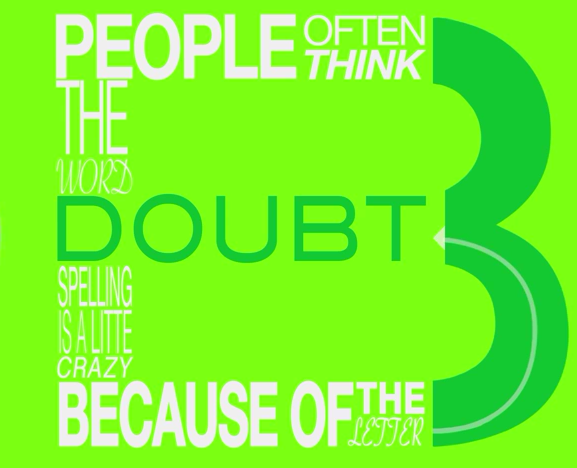(单词翻译:单击)
People often think the word "doubt" spelling is a little crazy because of the letter "b".
人们常常认为doubt这个词的拼法有点疯狂,因为里头有个字母b。
Since it doesn't spell a sound, most folks can't figure out what it's doing there.
由于它并不发音,大多数人不知道它到底在那儿是干什么用的。
But in spite of what most of us learn in school,
尽管我们在学校已被教导
sound is never the most important aspect of spelling an English word.
发音永远不是拼写英语单词时需要考虑的最重要的方面。
A word's meaning and history need to come first.
我们必须首先考虑一个词的历史和含义。
To doubt means to question, to waver, to hesitate.
To doubt的含义是‘询问’,‘踌躇’,‘犹豫不决’。
As a noun, it means uncertainty or confusion.
作为一个名词,它指的是一种困惑或不确定性。
The present-day English word "doubt" started as a Latin word, "dubitare".
现代英语中,‘doubt’这个词源于拉丁词‘Dubitare’。
It first moved from Latin into French where it lost both its "buh" sound and its letter "b".
它首先从拉丁语进入法语,失去了‘buh’的音和字母‘b’。
And then it came into English in the 13th century.
接着在十三世纪时,它进入了英语。
About 100 years later, scribes who wrote English but also knew Latin,
大约一百年后,懂英语也懂拉丁语的法学家
started to reinsert the "b" into the word's spelling, even though no one pronounced it that way.
开始将‘b’重新植入到doubt的拼写里,即便当时没人这么发音。
But why would they do this?
但为什么他们这么做呢?
Why would anyone in their right mind reinsert a silent letter into a spelling?
为什么会有人把一个不发音的字母重新植入到拼写中呢?

Well, because they knew Latin, the scribes understood that the root of "doubt" had a "b" in it.
呃,因为他们懂拉丁文,法学家知道‘doubt’的词根里有个‘b’。
Over time, even as fewer literate people knew Latin, the "b" was kept
随着时间的推移,尽管识字的人当中懂拉丁文越来越少,‘b’还是留了下来,
because it marked important, meaningful connections to other related words, like "dubious" and "indubitalbly,"
因为它被认为是重要的、是一个有意义的、连接其它相关词汇的连接词,比如说‘Dubious’和‘Indubitably’,
which were subsequently borrowed into English from the same Latin root, "dubitare".
因为这些词是英文借用了同一个拉丁字根‘Dubitare’而产生的。
Understanding these historical connections not only helped us to spell "doubt,"
了解这些历史的关联,不仅帮助我们拼写‘doubt’,
but also to understand the meaning of these more sophisticated words.
同时也帮助我们理解这些更为复杂词汇的含义。
But the story doesn't end there.
但故事并非到此为止。
If we look even deeper, we can see beyond the shadow of a doubt, just how revealing that "b" can be.
如果我们更深入地探究它,我们可以理解在这个doubt之外,这个‘b’是多么深具启发性。
There are only two base words in all of English that have the letters "d-o-u-b": one is doubt, and the other is double.
在所有英语中,只有两个基本词有‘d-o-u-b’这样的拼写,其中一个是doubt,而另一个是double。
We can build lots of other words on each of these bases,
我们可以以这两个词为词根,创造出许多衍生词,
like doubtful and doubtless, or doublet, and redouble, and doubloon.
比如doubtful,doubtless或doublet、redouble和doubloon。
It turns out that if we look into their history,
事实证明,如果我们回顾它们的历史,
we can see that they both derive from the same Latin forms.
我们便知道它们都源于同一拉丁文形式。
The meaning of double, two, is reflected in a deep understanding of doubt.
Double的意义,‘两个’,反映在一种对怀疑的深刻理解之中。
See, when we doubt, when we hesitate, we second guess ourselves.
看,当我们怀疑时,当我们犹豫时,我们批评、纠正自己。
When we have doubts about something, when we have questions or confusion, we are of two minds.
当我们怀疑某事时,当我们遇到问题或感到困惑时,我们犹豫不定。
Historically, before English began to borrow words from French, it already had a word for doubt.
从历史上看,在英语开始从法语那儿借词汇之前,英文已经有了意为怀疑的词。
That Old English word was "tweogan," a word whose relationship to "two" is clear in its spelling as well.
在古英语中,这个单词是‘Tweogan’,它与‘Two’之间的关联性在拼写上展现得一清二楚。
So the next time you are in doubt about why English spelling works the way it does, take a second look.
所以,当你下次对英文的拼写方式感到怀疑时,再仔细瞧瞧。
What you find just might make you do a double-take.
也许之后,你便会恍然大悟了。


